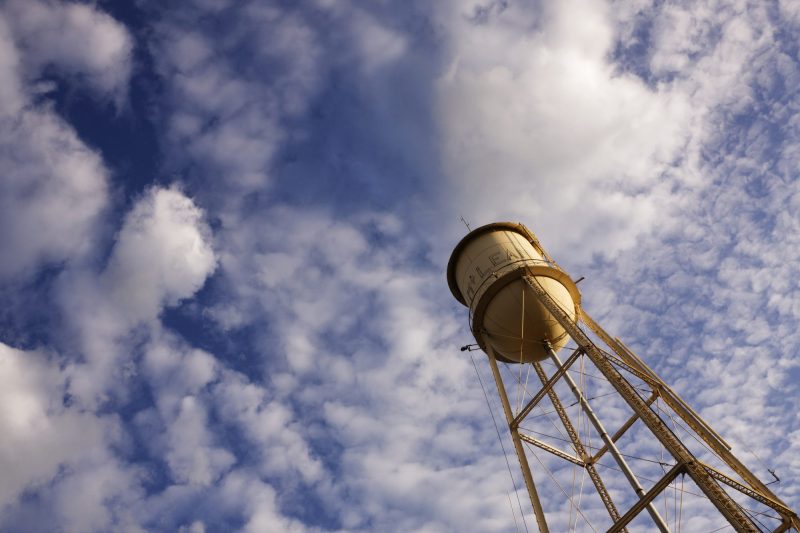
Rep. Andy Biggs, R-Gilbert, with members of the conservative Freedom Caucus who stormed a closed-door impeachment hearing in October. Biggs, in just his second term in Congress, was elected chairman of the high-profile caucus last year.
/ Photo by Wissam Melhem/Cronkite News
By Bryan Pietsch and Wissam Melhem | Cronkite News
The late Sen. John McCain combined leadership positions that came from almost four decades in Congress with a flair for the media spotlight – as one analyst noted, the Arizona Republican was typically “unavoidable for comment.”
The current Arizona delegation has nowhere near the tenure or clout of McCain. But between them, they have managed to combine important committee and caucus assignments with aggressive media appearances to give the delegation a presence bigger than its relatively short tenure would indicate.
That is partly by design – one expert said party leaders may want to make electorally important states like Arizona “kind of … front and center” – and partly due to the lawmakers’ own initiative.
Arizona’s House delegation has an average tenure of 5.5 years in Washington, well below the 8.6 years for the House as a whole, according to the Congressional Research Service. On a list of longest-serving House members, Rep. Raul Grijalva, D-Tucson, finishes 77th and Reps. Paul Gosar, R-Prescott, and David Schweikert, R-Fountain Hills, fall at 161 and 176. None of the other six delegation members cracks the top half of the list.
The state’s senators, Democrat Kyrsten Sinema and Republican Martha McSally, are both freshmen, with just over a year in the upper chamber compared to an average tenure of 10.1 years there.
Yet, in the House, the Arizonans have managed to stand out.
The delegation includes a standing committee chair, two chairs of influential caucuses, chairs and ranking members on several subcommittees and, particularly among some Republicans during President Donald Trump’s impeachment, an “unavoidable for comment” media presence.
The senators have been quieter, but McSally was named chair of an Energy and Natural Resources subcommittee and Sinema is ranking member on subcommittees in the Commerce and the Homeland Security committees.
One reason Arizona lawmakers are getting leadership positions might be a recognition by party leaders of the state’s growing electoral importance, said Ryan Collins, director of government affairs at the Center for American Progress, a left-leaning think tank. Both Democratic and Republican national committees named Arizona a battleground state for 2020.

/Photo by Miranda Faulkner/Cronkite News
“Arizona is a state that is increasing in population, it is becoming an increasingly important electoral state, not only on presidential level but in Senate races,” Collins said.
And partisan battles loom large in the delegation’s biggest footprint so far.
Rep. Andy Biggs, R-Mesa, in just his second term, was elected chairman this year of the Freedom Caucus, a small but influential bloc of conservative House members. The caucus made its name challenging Republican House leadership for being too moderate, but has emerged this year for its outspoken defense of Trump during the impeachment.
Biggs was among a group of Republicans who stormed a secure hearing room in October to protest initial closed-door hearings by the Intelligence Committee. Democrats said the stunt threatened the security of the facility, but it drew widespread attention on cable news and social media.
Biggs was one of five GOP House members accounting for at least repeatedly attacked as an “unfair, politically biased, rigged process.”
Lesko, who has taken her defense of the president to cable news, scoffs at the notion that freshmen should keep a low profile.
“I believe I’m an elected member of Congress, and I can say what I want,” said Lesko, who is also the ranking member on the Homeland Security Committee’s subcommittee on transportation and maritime security and a co-chair of the Congressional Women’s Caucus.
A blessing and a smart political move, political experts said.
“Absolute Trumpism has become a way to get ahead in this Republican Party,” said Arizona-based political consultant Jason Rose.
“Congressmembers Biggs and Lesko are among that movement’s biggest adherents.”
Collins thinks Biggs and other Republicans found the blueprint to leadership positions in a GOP that has been “shifted by Donald Trump.”
“Biggs is a perfect example of somebody who has kind of figured out how the process works and recognizes the formula to be helpful in a modern Republican Party, which a sizeable population of Arizona probably identifies closely with,” Collins said. Biggs’ office did not respond to repeated requests for comment.
Media and social media give newer lawmakers power that used to be measured in positions like committee chairmanships, said Nathan Gonzales, an editor at Inside Elections.
“Twitter and cable news allow junior members to establish a profile without relying on seniority,” Gonzales said. “You don’t have to be the chairman of a committee to attract attention.”
But Arizona does have a committee chairman: Grijalva, first elected in 2002, became chairman of the Natural Resources Committee when Democrats retook control of the House this year. He was appointed to the committee in his first term and served most recently as ranking member for several years.
Rep. Debbie Lesko, R-Peoria, in her first full term, has made a name for herself as an outspoken critic of the impeachment process.
Grijalva said experience in Congress shouldn’t be taken for granted. It’s often better to keep your head down and get to work, said Grijalva, who said he can now “have influence” on legislation, often prioritizing issues affecting Arizona.
“You got that position as a consequence of doing your job,” he said, adding that power ultimately depends on which party is in the majority.
Grijalva, who has been in the minority for six of his nine terms in Congress, said going on cable news is one way to have your voice heard – if not through legislation – without being in the majority.
Outspokenness is not new for Arizona politicians – it was Rose who said McCain was “always unavoidable for comment, but … in a way that enhanced his reputation.” But speaking out is not the only way the state’s lawmakers can make their presence felt.
Rep. Paul Gosar, R-Prescott, is chairman of the Congressional Western Caucus, which advocates for local control of federal lands and greater access to natural resources, a position in which he often tangles with Grijalva. Gosar is also ranking member of Natural Resources’ Subcommittee on Energy and Mineral Resources.
Three-term Rep. Ruben Gallego, D-Phoenix, chairs a Natural Resources subcommittee on indigenous people, is an assistant Democratic whip and holds vice chairmanships in the Hispanic and Progressive caucuses. Schweikert is senior House Republican on the Joint Economic Committee.
Democratic Reps. Greg Stanton of Phoenix, Ann Kirkpatrick of Tucson and Tom O’Halleran of Sedona are all members of the New Democrat Caucus, and O’Halleran is a co-chair of the Blue Dog Coalition of moderate Democrats.“In Congress, you have showhorses and workhorses,” Grijalva said, adding that “workhorses” focus on legislation and attend hearings and meetings regularly. “I think workhorses are important.”`







